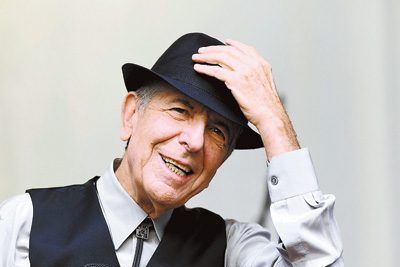
LEONARD COHEN, a hugely influential singer and songwriter, whose work spanned five decades, died at the age of 82. Cohen’s label, Sony Music Canada, confirmed his death on the singer’s Facebook page. Cohen, who died Monday in Los Angeles, was buried three days later in Montreal alongside his family, local media reported Friday citing the Jewish congregation Shaar Hashomayim. The announcement of his death was made after his burial, which was reportedly attended by his close friends and family. Cohen was the dark eminence among a small pantheon of extremely influential singer-songwriters to emerge in the ’60s and early ’70s. Only Bob Dylan exerted a more profound influence upon his generation, and perhaps only Paul Simon and fellow Canadian Joni Mitchell equaled him as a song poet. Cohen’s haunting bass voice, nylon-stringed guitar patterns, Greek-chorus backing vocals shaped evocative songs that dealt with love and hate, sex and spirituality, war and peace, ecstasy and depression. He was also the rare artist of his generation to enjoy artistic success into his 80s, releasing his final album, “You Want It Darker,” earlier this year. Cohen is best known for his gravelly intoned songs, including “Dance Me to the End of Love,” “Hallelujah,” “Bird on a Wire,” among others. Cohen was born in Westmount, Quebec. He learned guitar as a teenager and formed a folk group called the Buckskin Boys. After graduating from McGill University, Cohen moved to the Greek island of Hydra, and published the poetry collection “Flowers for Hitler” (1964) and the novels “The Favorite Game” (1963) and “Beautiful Losers” (1966). Frustrated by poor book sales, and tired of working in Montreal’s garment industry, Cohen visited New York in 1966 to investigate the city’s robust folk-rock scene. He met folk singer Judy Collins, who later that year included two of his songs, including the early hit “Suzanne,” on her album “In My Life.” His New York milieu included Andy Warhol, the Velvet Underground, and, most importantly, the haunting German singer Nico, whose despondent delivery he may have emulated on his exquisite 1967 album “Songs of Leonard Cohen.” Cohen quickly became the songwriter’s songwriter of choice for artists like Collins, James Taylor, Willie Nelson and many others. His black-and-white album photos offered an arresting image to go with his stark yet lovely songs. During the 70s, Cohen set out on the first of the many long, intense tours he would reprise toward the end of his career. (SD-Agencies) | 
